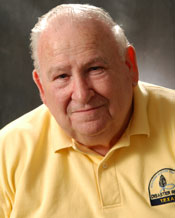DALLAS—Robert “Bob” Dixon, who pioneered Southern Baptist disaster relief ministry more than 50 years ago—seeing DR deployments as “invitations from the Father”—died May 10 at age 90.
Dixon fashioned homemade “buddy burners” from gallon-sized coffee cans when, in the wake of Hurricane Beulah in 1967, he was dispatched to the Rio Grande Valley from a Royal Ambassadors boys camp.
His task: to do what he could to coordinate volunteers who would use the one-pot buddy burners to prepare breakfast for truck drivers delivering food and clothing to storm survivors.
“At the time, nobody knew I had received disaster relief training by the U.S. Bureau of Mines when I was with the Tennessee Valley Authority,” Dixon recalled in a Baptist Press story prior to his retirement in 1998.
Within three years, Dixon had become executive director of Texas Baptist Men, which created Southern Baptists’ first tractor-trailer disaster relief unit equipped with a field kitchen, ham radio, bunks for a volunteer crew and a generator for emergency power.

Bob Dixon
Dixon’s initiative sparked Southern Baptists’ national disaster relief ministry, with DR volunteers and equipment in all 50 states who deploy for hurricanes and other natural disasters both in the U.S. and internationally.
Southern Baptist Disaster Relief now encompasses 70,000 trained volunteers—including chaplains—and 1,550 mobile units for feeding, chainsaw, mud-out, child care, shower, laundry, water purification, communication and power generation. SBDR is one of the three largest mobilizers of trained disaster relief volunteers in the U.S., along with the American Red Cross and The Salvation Army.
At his memorial service on May 19, at TBM’s Robert E. Dixon Missions Equipping Center in Dallas, disaster relief volunteers wore their yellow DR shirts—the familiar color for their shirts and hats in deploying to innumerable natural disasters.
“The work and ministry Bob Dixon started at Texas Baptist Men has literally changed the world,” said David Hardage, executive director of the Baptist General Convention of Texas. “He will be long remembered and the work he began will continue for years to come.”
David Melber, president of the Send Relief arm of the SBC’s North American Mission Board, said Southern Baptists have served millions of people through DR since Dixon’s venture after Hurricane Beulah.
“We certainly stand on the shoulders of those who have gone before us and Bob set the foundation,” Melber said. “This ministry can be traced back to Bob’s desire to simply recruit, engage and mobilize volunteers for the sake of serving those in great need.”
For Dixon, disaster relief always had a spiritual dimension.
Mickey Lenamon, current TBM executive director, credits Dixon with teaching him an important leadership principle—to ask, “Who can do the job better than me?”
“He taught me to look for others’ spiritual gifts and empower them to serve,” Lenamon said.
Mickey Caison, who led Southern Baptist Disaster Relief for 23 years until his retirement last year, recounted, “From my first encounter with Bob Dixon I realized he was a man who was very passionate for involving men and boys in a personal relationship with God. He sought to teach them about God and involve them in God’s service. That was his purpose for his life and TBM.
“I could see his willingness to use so many other means to provide mission education and mission involvement for men and boys. The many different ministries of TBM was evidence of this process,” Caison added. “He demonstrated that the more opportunities you give volunteers the more volunteers will respond. He tapped into their skills and abilities and provided opportunity for men and boys to be used of God to touch their world.” (BP)